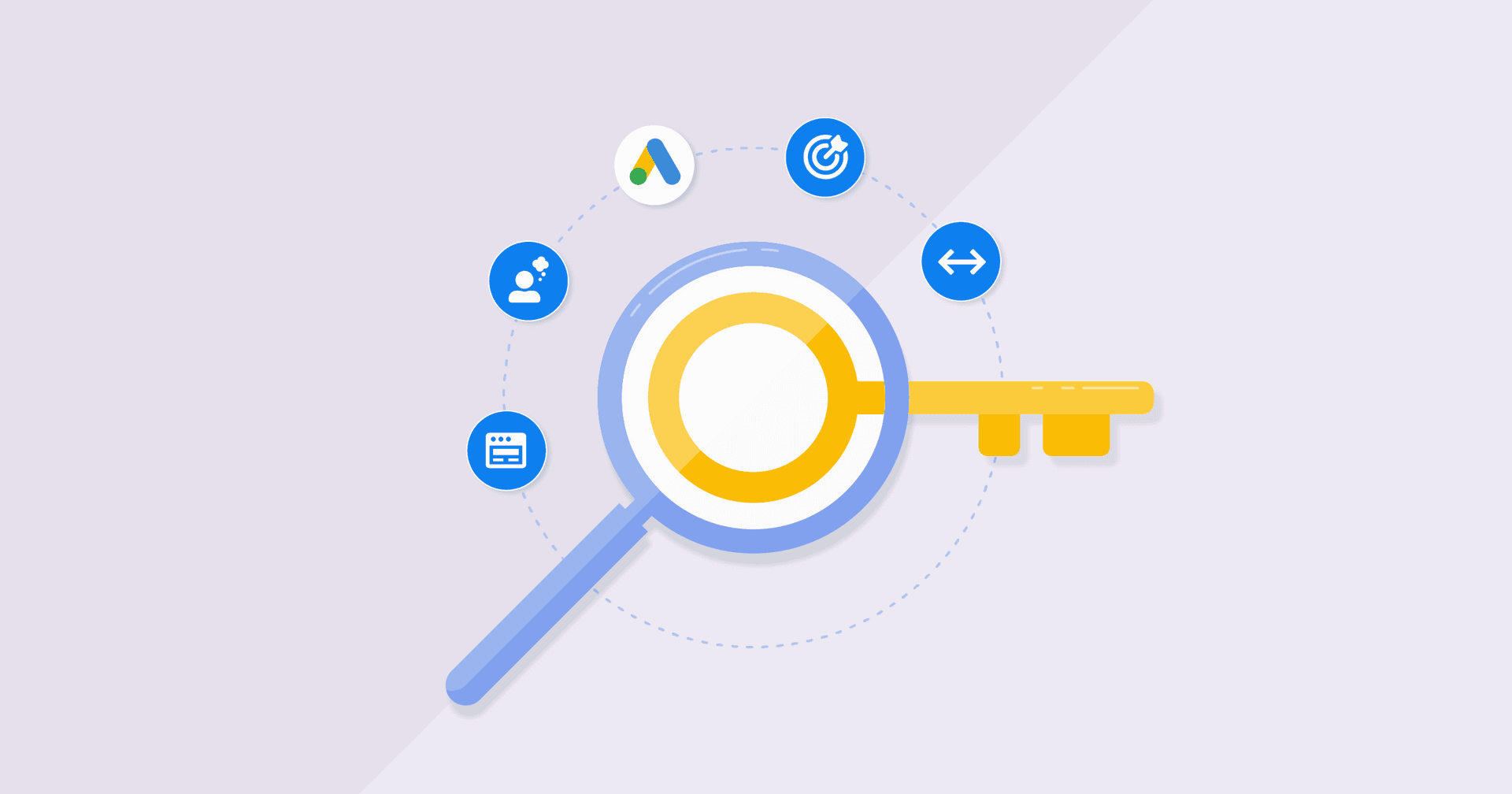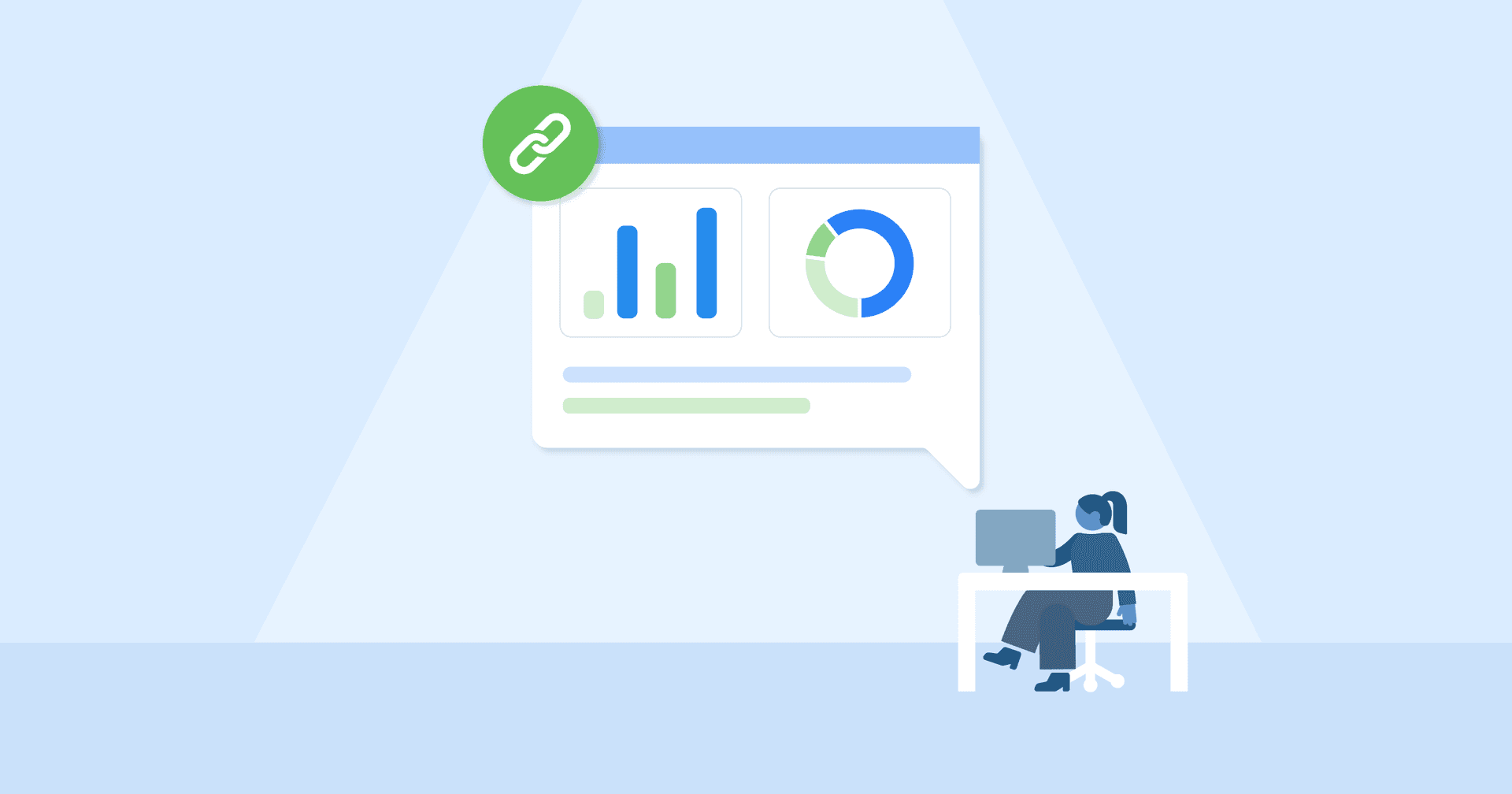Table of Contents
QUICK SUMMARY:
Off-page SEO, essential for search visibility, works to boost a website's reputation and authority with the goal of increased search rankings. It relies on external sources like links as well as brand and social media mentions, making effective execution of off page SEO important. This guide delves into what off page SEO is, why it matters, and how you can improve it to grow organic website traffic.
Imagine this: your web page, standing tall on the first page of search engine results, attracting a steady stream of high-quality organic traffic. Sounds like a dream, right? Well, it's time to turn that dream into reality with the power of off-page SEO.
In the ever-evolving world of digital marketing, off-page SEO has (so far) remained a critical factor that search engines consider when deciding rankings. It's the secret sauce that can catapult your client's web page to the top of search results, even in the most competitive niches. But what exactly is off-page SEO, and how can it supercharge your SEO efforts?
Part of a thorough website audit process, Off-page SEO includes all the activities that happen away from the website but contribute to the search engine rankings. It's like a popularity contest where votes come in the form of links from other websites, social media buzz, and other online interactions. These off-page SEO factors are a testament to the quality and relevance of the content, and search engines love them, when they are done right!
But here's the catch: off-page SEO isn't a one-and-done deal. It's an ongoing strategy that requires careful planning and execution. It's the yin to the yang of on-page optimization, and together, they form the backbone of a robust SEO strategy.
In this blog post, we'll dive deep into the world of off-page SEO, exploring how off-page optimization can complement your on-page SEO efforts and create a well-rounded off-page SEO strategy. So, whether you're a seasoned marketing agency or a small business owner, buckle up and get ready to revolutionize your SEO game!
If you want to learn how to get more organic traffic from Google, keep reading.
What Is Off-Page SEO?
Off-page SEO, also known as off-site SEO, is search engine optimization done outside your website.
It involves improving search engine and user perception of a site's popularity, relevance, trustworthiness, and authority. This is achieved by other reputable places on the Internet (pages, sites, people, etc.) linking to or promoting a website, and effectively vouching for the quality of the content.
Interestingly, many experts agree that social media signals such as followers, likes, shares, etc. don't necessarily affect search engine rankings.
That said, social media marketing can certainly help indirectly by creating more buzz around your brand (which you can track using social media listening tools), which may lead to more backlinks, mentions, and reviews.
Pros of Off-Page SEO | Cons of Off-Page SEO |
|---|---|
Increased Rankings: Off-page SEO can help improve your website's position in SERPs (Search Engine Results Pages). | Time-Consuming: Building a strong network of quality backlinks and establishing a solid reputation online takes time and consistent effort. |
Greater Exposure: Higher search engine ranking also means more link exposure, which can lead to more website traffic. | Lack of Control: You don't have direct control over off-page SEO as it involves factors outside of your website, such as backlinks from other sites. |
Improved Page Authority: Off-page SEO can increase your page authority score, which is a measure of the importance of web pages as perceived by Google. | Risk of Negative SEO: Your site could be vulnerable to negative SEO attacks, where competitors use black-hat techniques to harm your site's rankings. |
Established Credibility: If your site is referenced by authoritative sites, it can increase your site's perceived credibility and reputation. | Dependent on Others: The success of your off-page SEO strategy often depends on others, such as whether other reputable sites are willing to link to your content. |
Long-Term Results: While it takes time to build, the benefits of off-page SEO can be long-lasting, providing a continuous return on your SEO efforts. | Penalties: If not done correctly, off-page SEO can lead to penalties from search engines, especially if it involves spammy or unethical link-building practices. |
On-Page SEO vs. Off-Page SEO
You may be wondering what is more important: on-page SEO or off-page SEO?
Having your on-page SEO sorted out is the bare minimum if you are interested in search engine optimization, and each web page on your website should be optimized.
However, it is often the case that off-page SEO ultimately determines how well your website is going to do on search engine results pages (SERPs).
The reason for this is likely related to the fact that you have full control of on-page SEO, but you have much less control of off-page SEO since it largely revolves around other people acknowledging your website.
This makes off-page SEO a more reliable indicator of your site's value to your visitors.
After all, anyone can optimize their own website, but you need to provide value if you want to get backlinks, brand mentions, and customer reviews.
That is why you should start by implementing on-page SEO best practices, and then shift your focus to off-page SEO.
Off-Page | On-Page | |
|---|---|---|
Definition | Refers to actions taken outside of your own website to impact your rankings within search engines. | Refers to actions taken directly within your own site to improve its position in search rankings. |
Includes | Backlinks from other websites, social media marketing, guest posting, influencer marketing, and other external signals. | Content optimization, meta tags, URL structure, internal linking, keyword usage and density, site speed, mobile-friendliness, etc. |
Purpose | To improve the site's reputation and authority in its industry. It tells search engines that the website is an ideal search result because it is from a reputable, reliable, trusted source. | To make the site as search-friendly as possible. It tells search engines what the website and its pages are about, and how relevant and useful it is to users. |
Control | You have less control over off-page SEO as it involves external factors. | You have full control over on-page SEO as it involves factors within your own website. |
Impact on Rankings | Off-page SEO factors, particularly backlinks, are considered by search engines to be strong indicators of a site's authority and relevance, and can significantly impact rankings. | On-page SEO, while important for rankings, typically has less of an impact than off-page factors. However, poor on-page or technical SEO issues can significantly harm a site's rankings. |
Time to See Results | Can take a longer time to see results as building a reputation and backlinks takes time. | Changes can have an immediate impact on rankings, but it may still take some time for search engines to re-crawl and re-index the website. |
Does Internal Linking Count as Off-Page SEO?
You may think so because the off-page optimization is happening on a different page. But you'd be wrong. Internal linking within a website does not count as part of your off-page SEO strategy. It's actually a part of on-page SEO. Here's why:
Off-page SEO refers to actions taken outside of your own website to impact your rankings within search engine results pages (SERPs).
On the other hand, on-page SEO includes all the measures that can be taken within your website to improve its position in search rankings. This includes content optimization, meta tags, URL structure, and internal linking.
Internal linking refers to any links from one page on a domain, which lead to another page on the same domain. It's used primarily for navigation purposes, and it helps with website hierarchy and the distribution of site equity. Although internal linking is a very important part of a successful seo strategy, because all of this happens within the same website, it's considered a part of on-page SEO, not off-page SEO.
This is why some use the term "Off-Site SEO" instead of off-page SEO, because it makes it much clearer that these off-page SEO factors are all about what other websites do to help your client's website climb up search engine ranking and drive more organic search traffic.
What Are the Off-Page SEO Ranking Factors?
So, what off-page SEO ranking factors help Google and other search engines determine where your website appears on SERPs?
Well, the truth is that, except for those who work at Google, no one really knows what these SEO factors are.
That being said, it seems that the four most important factors are backlinks, brand mentions, customer reviews, and - to a lesser extent - social media marketing.
Backlinks: In general, the more high-quality backlinks your website has, the more likely it is to rank well. This is the most common and effective off-page SEO method. It involves getting external websites to link back to your website. Backlinks from high authority, relevant sites are highly valued by search engines.
Brand mentions: It seems that brand mentions, both linked (e.g. AgencyAnalytics) and unlinked (e.g. AgencyAnalytics) ones, can improve your search rankings. Having your brand mentioned on high-traffic, reputable websites can signal to search engines that your site is recognized and trusted by others in the industry.
Customer reviews: It appears that customer reviews on authoritative websites can also help your search rankings. Positive reviews and ratings on review sites improve your site's online reputation and encourage more people to visit your site.
Social Media Marketing: While social media signals don’t have a direct impact on search rankings, they affect your search engine optimization efforts in primarily four ways: Increased online visibility and traffic to your website, increased authority and brand recognition, broader content distribution, and longer content lifespan.
Out of these three ranking factors, backlinks are the most important one (after all, Google probably still uses PageRank), so quality link building should be a primary focus regarding off-page SEO.
Cumulative Impact of Off-Page SEO
Off-Page SEO, also known as off-site SEO, plays a crucial role in enhancing a website's visibility and ranking on search engine results pages (SERPs). The cumulative impact of off-page SEO is significant as it feeds into itself, creating a cycle that helps a website build a robust and sustainable SEO impact over time.
One of the primary components of off-page SEO is building links, also known as backlinks. These are links from other sites that direct users to your website. When your site receives a backlink from an authoritative and relevant website, it sends positive off-site SEO signals to search engines. These signals indicate that your site provides valuable content, which in turn improves your search engine rankings.
Google can't yet make a qualitative decision about a website. It can tell what it's about but it can't tell if it's important or useful just by reading the site. One of the main factors it uses to determine important is backlinks, because these act as "votes of confidence." If it trusts the sites that are linking to you, you get a portion of those referring sites' trust. It's just that simple.
Jens Rhoades, Founder, Floodlight SEO
As your site's ranking improves, it becomes more visible and is found by more people. This increased visibility leads to more people linking to your site, further enhancing your site's authority and ranking. It's a self-sustaining cycle: the more quality links you have, the higher your site ranks; the higher your site ranks, the more people find your site and link to it.
It's important to note that not all links are created equal. Search engines prioritize natural links, which are voluntarily created by other sites because they find your content valuable and relevant. These natural links are a strong indicator of the quality and relevance of your content, and they contribute significantly to your site's SEO strength.
So, while you may need to do some off-page SEO work to help get the ball rolling, the end goal is to create rich, relevant, ranked content that other sites will want to link to naturally.
Impress clients and save hours with custom, automated reporting.
Join 7,000+ agencies that create reports in under 30 minutes per client using AgencyAnalytics. Get started for free. No credit card required.
Already have an account?
Log in
How to Get More Backlinks
Of course, the next question is, how do you get backlinks?
Now, before we get into link-building tactics, we need to be clear on one thing: quality is more important than quantity.
The more authoritative the website is, the greater the SEO boost from a backlink.
When used properly, backlinks are an invaluable tool for bolstering industry & domain authority and for supporting on-page optimizations.
Matthew Cernik, Head of SEO, King Kong
Domain Authority (DA) is a metric created by Moz that predicts how well a website will rank on SERPs. It uses a scale of 1 to 100. You can check domain authority using Moz’s free Domain Analysis tool.
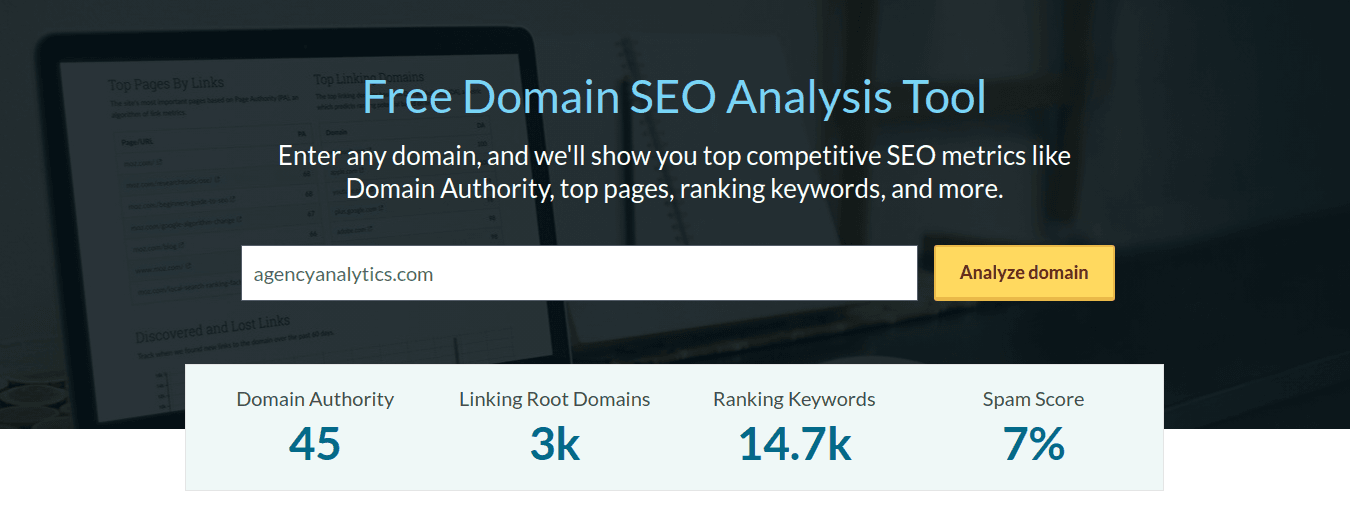
Adam Enfroy, who grew his blog from zero to 178,021 unique visitors in 2019 through aggressive link building, advises aiming for blogs with a Domain Authority of 50+ when guest posting.
This “DA 50+” rule can also be applied to other off-page SEO tactics such as broken link building and podcast appearances.
Also, when building links, ensure that the website in question provides dofollow links, as opposed to nofollow ones (for example, sites like Wikipedia, Quora, etc. use nofollow links). However, you want a natural mix as an exclusive focus on one vs. the other could come across as an attempt to game the algorithm.
Diversity in backlinks is also important. A balanced mix of follow, no-follow, paid, and organic links is a smart practice! Backlinks build value. Value brings hiring ranking keywords. Highly ranking keywords bring traffic.
Christopher, Website Design and SEO, D2 Branding
Now that we have established that you should aim for links from authoritative websites, let’s discuss how you can get those links.
Ideally, your link building strategy should include (at least a few of) the following five tactics:
Guest blogging
Podcast appearances
Broken link building
Linkable resources
Network
Guest Blogging
Guest blogging, also known as guest posting, is probably the most popular link-building tactic out there.
The main idea behind guest posting is that you write an article for authoritative and relevant websites in exchange for a backlink to your website. Even in today's digital landscape, guest posting is still - by and large - the most popular link-building strategy.
In his article “Guest Blogging in 2020: How I Wrote 80+ Guest Posts in 1 Year” Adam Enfroy provides this five-step process:
Understand your value: Before you begin guest posting, you need to figure out how you will provide value to bloggers. If you want them to publish your guest posts, what can you offer them? As the article advises: “Don’t go into the process of guest blogging for SEO only thinking about what you’ll get out of the deal. First, you need to focus on the benefits you’ll give the site.”
Create a spreadsheet with a list of websites: It only needs five columns—website, name, email address, status, notes. Check the domain authority of each website before including it in your list. As mentioned, go for ones that have a DA of 50+.
Find the right person to contact: Use LinkedIn to identify who you need to reach out to (search for people within that company who have “editor”, “content”, etc. in their title). Then find their email address through SEO agency software tools like Hunter.io and ContactOut.
Reach out via cold email: Start contacting people—keep your email short and showcase your previous work. As the article says: “In the end, it’s about treating each person as a friend, personalizing your content, providing value in the form of links, and getting right to the point.”
Here’s Adam’s cold email template that has an 80%+ open rate and 50%+ response rate:
“Subject Line: Hey (First Name) // Content and Link Building Opportunities – Adam from (Company)
Hey (First Name),
My name’s Adam and I’m the (Job Title) at (Company).
I’m reaching out because I love (Target Blog) and your (Target Article) really resonated with me because (Reason).
I was curious if:
1) You’d like to participate in link building. I write (X-X) guest posts per month and would be happy to link to your site in my content.
2) You allow guest posts on your blog.
I’d love to contribute to your (awesome? informative? useful?) blog and can pitch some topic ideas that I think your audience will enjoy. Here are some recent samples from me:
(Sample 1 URL)
(Sample 2 URL)
(Sample 3 URL)
Please let me know if you’re interested and I look forward to hearing back from you soon!
Thanks,
Adam”
He mentions that this email template is on the long side, so you may want to experiment with shortening it.
Finally, you want to perfect your topic pitch over time. Make sure that this topic isn’t already covered on their site (search “site:blog.com topic” on Google) and target a valuable keyword that matches their audience’s interests. And, of course, only pitch topics that match your expertise.
Follow this process, and you should be able to get guest posts published on high domain authority websites.
However, where you place your client's guests posts is as important, if not more so, than generating backlinks.
When someone asks you to improve their domain authority, don't go out and build links from any blog that welcomes guest blog posts, as this will damage your client's SEO, even if it makes the vanity metric of increased domain authority look good.
Daniel Noakes, Founder, UClimb
Podcast Appearances
Podcast appearances are an under-utilized off-page SEO tactic.
According to Edison Research’s “The Infinite Dial 2020” report, 75% of the total U.S. population aged 12+ are familiar with podcasts.
Moreover, 37% of the total U.S. population aged 12+ have listened to a podcast in the last month and 24% have listened to a podcast in the last week. And these weekly podcast listeners averaged six podcasts in the last week.
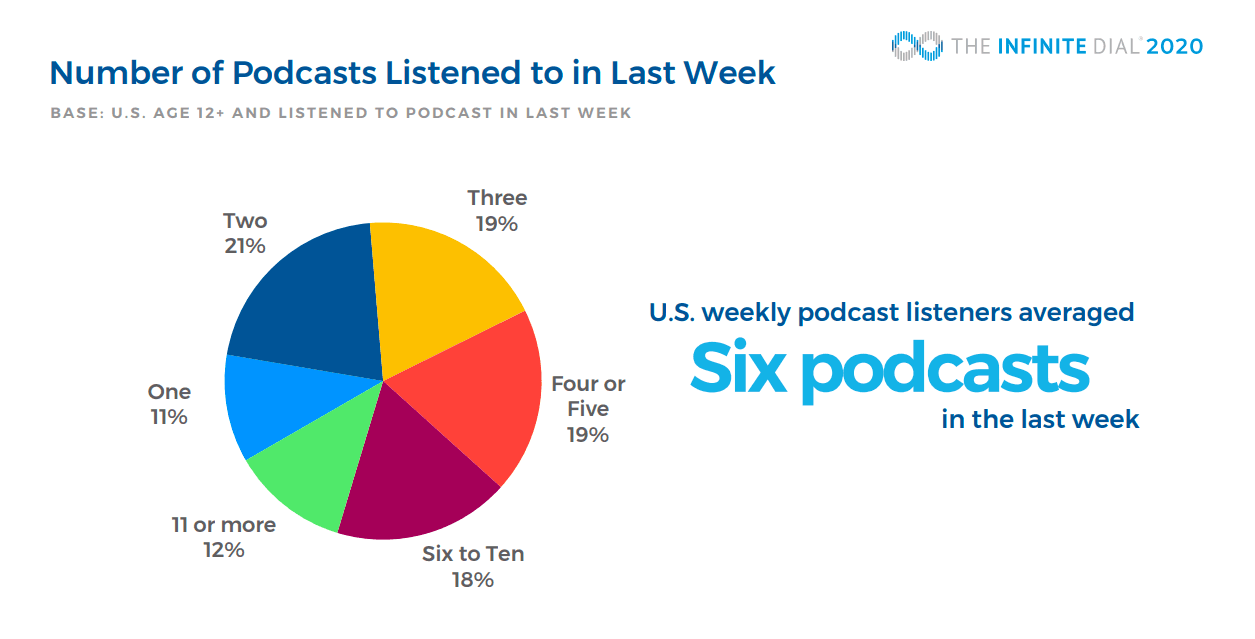
According to the same report, the number of monthly podcast consumers increased by 16% year-over-year in 2019, so it’s probably safe to say that podcasts will only grow in popularity in the foreseeable future.
This provides an excellent off-page SEO opportunity since appearing on a podcast is usually less time-consuming than writing a guest post, but you still get a high-quality link (provided that the podcast in question is popular).
Dorie Clark, a Duke and Columbia business professor and an author, used podcast appearances to launch her book “Stand Out” back in 2015 when she secured 160 podcast appearances over the course of a year.
And with her most recent book, “Entrepreneurial You”, she hit the same number in only four months. That’s a lot of podcasts!
Here’s a five-step process that she shared in his Harvard Business Review article “How to Get Booked as a Podcast Guest”:
Identify which podcasts you want to target: You should find your “media doppelganger”. As she writes: “For instance, if you’ve written a book about negotiation, find other well-known authors or thinkers on that topic and go to the media page of their website and see which podcasts they’ve already appeared on.” That way, you will know which podcasts are interested in your topic and are open to interviewing knowledgeable people.
Search for warm leads: “Whether it’s sales or podcast appearances, you’re always more likely to succeed if you have an “in,” rather than pitching someone cold.” Take a look at the previous guests of your target podcast. Do you know any of them? If you do, then reach out to them and ask for an introduction. And if you don’t, then at least mention that you saw an expert on your topic on one of the previous shows, since that demonstrates that you have done your research.
Create a short pitch email: “Include a couple of sentences about you, laden with as many markers of credibility as possible; information on what you’d like to discuss on the show; and an explanation for why you’re reaching out to them, specifically.” And keep the email short!
Dorie provided a sample email template (note that the formatting is mine):
“Hi John,
My name is X.
I really enjoyed your recent discussion with Y about [his company name], and I wanted to reach out because I also run a startup in the fintech space.
[Insert 1–2 sentences of social proof, such as $ raised, who your clients or investors are, where you incubated, media plaudits, etc.]
We just [insert timely hook or angle] and I wondered if you might be interested in discussing it?
I thought this might be especially relevant to your listeners because of [insert reason]. If you think it might be a fit for your podcast, I’d be honored to continue the conversation.
Please let me know and thanks for considering.”
Dorie continues with a few more suggestions:
Make sure that you are prepared to leverage the opportunity: Take the time to think about the questions that you may be asked and how you want to answer them. Practice answering these questions with a colleague so that your answers would be tight and crisp. Also, make sure that your technical setup works for appearing on a podcast. High-quality headphones are essential because sound quality matters a lot. And if the podcast will also be recorded on video, then have a professional background and sort out the lightning.
End every podcast appearance with a clear call to action: You know how podcast hosts tend to end the episode with a “How can listeners learn more about you?” question? This is an opportunity to tell the listeners what you want them to do next (follow you on Twitter, download a lead magnet, pre-order your book, etc.). When Dorie was promoting her book “Stand Out”, she would mention that the listeners could download a free “Stand Out” self-assessment book. As she highlights: “I was able to more than double my email list—from 9,500 to 25,000—in nine months.”
Dorie also advises listening to at least one episode to ensure that the podcast is a good match for you.
And this isn't just a technique you can use to boost a client's off-page SEO value, podcasts are a great tool for your agency as well!
The biggest challenge is differentiating from more affordable but poor-quality services being offered by so many freelancers or small firms who don't have a very high skillset. We share knowledge freely very often with blogs, courses, resources, podcast appearances, guest lecturing, public speaking, etc., so people can see a glimpse of the real expertise we have.
Lane Anderson, Founder & CEO, London Road Marketing
Read More: 25 Best Digital Marketing Podcasts
Broken Link Building
Broken link building is an SEO tactic where you reach out to websites that have broken links and offer a replacement link that leads to similar content on your website.
Getting a backlink this way is less time-consuming than landing a guest post or a podcast appearance.
Here’s what SEO expert Brian Dean recommends in his Broken Link Building guide:
Find pages with a lot of links: Look for resource pages on Google. You can find them using these search strings:
“Keyword” + inurl:resources
“Keyword” + intitle:links
“Keyword” + “helpful resources”
“Keyword” + “useful resources”
Use a free Check My Links Chrome extension to identify broken links: All you need to do is add it to Chrome, go to the website that you want to check, and then click on the Check My Links icon.
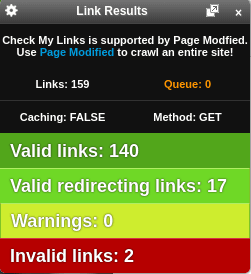
Find everyone that links to that broken link: You can do that with tools like Ahrefs and Moz.
Brian also recommends Ahrefs to see broken links on a competing website, then see who links to those broken links and reach out to them with your own link.
Also, he explains that to make the most out of this SEO tactic, you need to offer a replacement link that is very similar to the original link.
Here’s an email where he did just that:
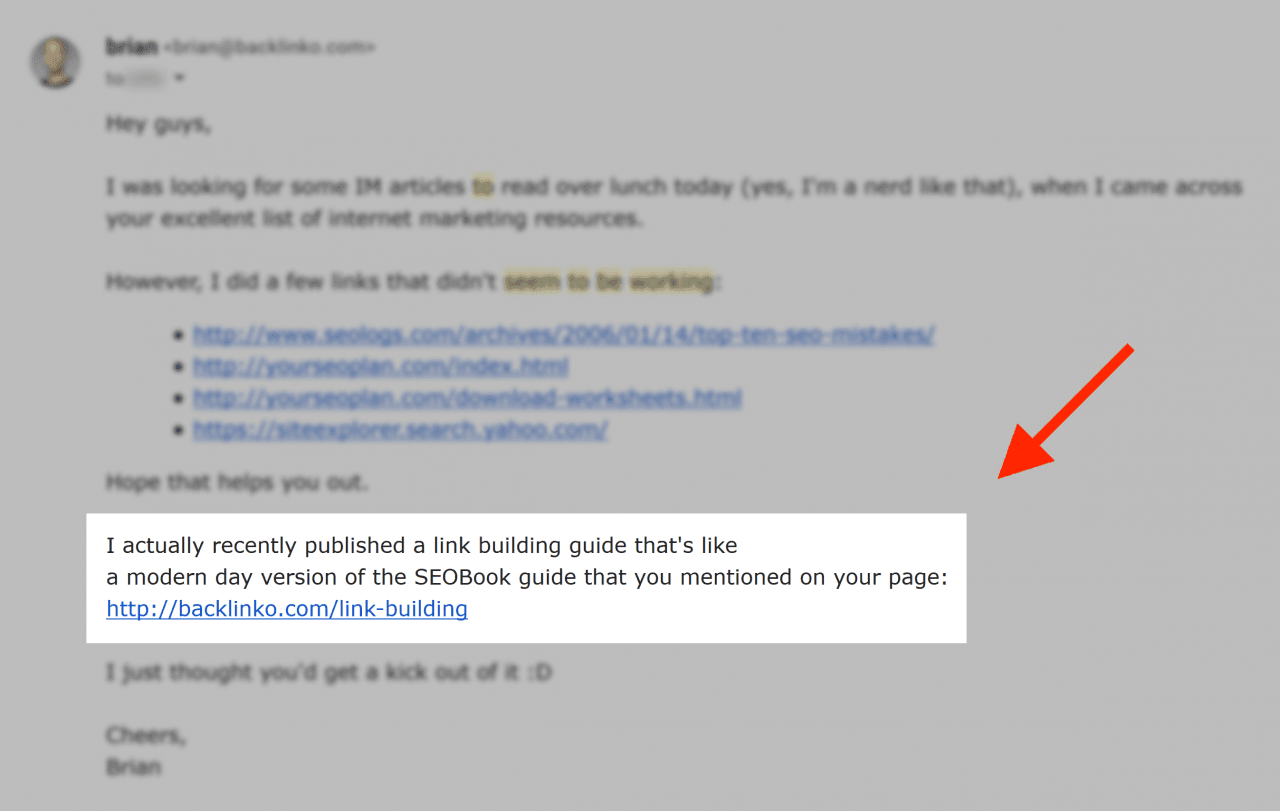
And if you want to take broken link building to the next level, Brian advises creating a piece of content that is 1:1 replacement for the dead link.
Of course, you shouldn’t plagiarize the original content, since that’s obviously unethical. “Instead, use the old content as a template. And create a similar resource that’s better and more up-to-date based on that template” he explains.
Linkable Resources
In addition to active link building efforts where you reach out to people to get a backlink, you also want to do passive link building in which you create resources that people link to on their own.
The three types of most linkable resources that writers need to produce high-quality content include statistics, case studies, and images.
Provide these resources and chances are you will start getting backlinks from writers who use them in their content.
Statistics
Original research is extremely valuable. It takes a lot of time, energy, and money to produce…which is why there isn’t that much of it out there.
Meanwhile, writers are expected to provide statistics with links to original sources in their articles. This means they are scouring the web trying to find stats that are relevant and recent.
For example, remember the Edison Research’s “The Infinite Dial 2020” report that I cited in the section on podcast appearances?
I searched for podcast statistics, found this research, and linked to it without them having to do anything (except original research, obviously!).
You may have also noted that I used images from the same report—this got Edison Research an additional link because writers are required to provide links to the images they use.
Consider making your research available as a well-designed PDF with beautiful graphics if you want to get more backlinks.
Case Studies
Case studies are often easier to produce than original research.
In order to create a compelling case study you need to do three things:
Identify something that you have achieved that other people also want to achieve.
Gather all the relevant data including numbers, email screenshots, analytics screenshots, etc.
Write up a post where you share what you did, what results did you get, and what you have learned from the experience.
Keep in mind that you need to tell a story, so make sure to create a narrative arc around the accomplishment.

For example, read the Shop Marketing Pros customer case study or any of the AgencyAnalytics case studies to gain valuable insights into how agencies save time and money using automated SEO reporting templates.
I have also linked to Groove’s “Behind the Scenes: How We’ve Built a $5M/Year Business in 3 Years With Content Marketing” several times in my articles because it’s such a great case study (note how they not only share their strategy, tactics, and data but also tell a story).
Now, you may think that you don’t have anything to share, but you probably do. Pretty much any post that is based on someone’s actual experience as opposed to theoretical musings has value.
There probably are quite a few people who want to get to where you are, but are struggling to figure out how. A case study on how you did it is valuable to them, and it's also valuable to writers who are looking for real-world examples.
Images
Writers are also required to provide images for the content they create.
Most of them don’t have graphic design skills, so what do they do?
They use relevant images from articles on similar topics.
And if that fails, they do a Google search (or use other search engines if you prefer), then go with the best image that comes up.
For example, the feature image for this article is a custom image by our team at AgencyAnalytics. However, all other images are either screenshots, images from articles on similar topics, or images from a report.
And you may notice that they have “Image Source” links below them that lead to the original sources.
No one asked me to include their images in this article—I included them in order to break up the text and make it more readable.
There’s an opportunity here, because if you invest in custom images for your blog posts, you may get backlinks from writers like myself who need those images.
Infographics work best, but custom images that explain a specific concept or illustrate a statistic are also great.
And don't forget about Memes! People love memes, and we have found that marketing agencies love marketing memes! That's because they are funny, relevant, and relatable.

It's also worth mentioning that it can less expensive than you think. You don’t need to hire a full-time designer for that. DesignPickle offers a dedicated designer, unlimited design requests, and unlimited revisions from $399/month.

Networking
Finally, if you want to get high-quality backlinks, you need to grow and nurture your network.
In his previously mentioned article on guest blogging Adam Enfroy explained that: “if you’re new to blogging, it may not make sense to reach out to a site like Forbes or The Huffington Post, as those require real-world relationships and connections.”.
It’s important to understand that editors of top publications get a ton of cold emails with guest post pitches every day.
Your chances of landing a guest post are much better if someone that the editor knows and trusts introduced you to them.
You will also have a much easier time getting backlinks and brand mentions from writers if they know you.
So work on your network. Email people to let them know that you appreciate their work. Connect with them on LinkedIn. Attend meetups and conferences.
Also, up-and-comers tend to be more open to new connections than established influencers, so if you notice someone who has potential, but isn’t quite there yet, be sure to reach out to them.
Just make sure that you always provide value before you ask for anything.
What About Brand Mentions And Reviews?
Okay, so now that we covered backlinks you may be wondering how to get more brand mentions and reviews.
Brand Mentions
Tying this into the last section, one of the best ways to increase brand mentions is to get more backlinks.
The more people are exposed to your brand and the more buzz there is around it, the more likely it is to be mentioned on high domain authority websites.
You can also make an effort to build relationships with writers who cover your niche. That way they’ll be more likely to think about your brand when writing and mention it in their articles.
Additionally, once you have established a relationship with a writer, you can let them know that if they ever need an expert quote, they are welcome to reach out to you.
Customer Reviews
It’s not clear how much customer reviews influence search rankings except that they are essential for local SEO. However, it’s probably safe to say that positive reviews can only help, so you may want to make an effort to get them.
Customer reviews are one of the few things that readers are likely to trust, as they have to be earned.
Richard Jaggs, Director, Resolution Design
You can increase the number of customer reviews on authoritative websites by being proactive about it.
Once the customer has tried your product, send an email to them asking for feedback, ideally something super easy and quick, such as rating your product on a scale from 1 star to 5 stars.
Keep in mind that this rating is simply feedback that does not have any influence on search rankings since it’s known only to the customer and to your company.
Now, if you get a 4 or 5-star rating, you can reach out to the customer again and ask them to leave a review on an authoritative customer review website in your niche.
Capterra is an example of such a website. They publish software reviews, so if you are selling software, getting more Capterra reviews may be a good idea.

FAQs That Help You Nail Off‑Page SEO
Still have questions about off-page SEO? Don’t worry—we’ve got you covered.
The four types of SEO are on-page SEO, off-page SEO, technical SEO, and local SEO. On-page focuses on your content and site structure. Off-page is about building authority through backlinks and brand mentions. Technical SEO ensures your site is crawlable and fast. Local SEO targets visibility in geographic search results, like Google’s Map Pack.
The primary difference between on-page and off-page SEO lies in control and location. On-page SEO involves optimizations made directly on a website—like title tags, internal links, and content. Off-page SEO involves external efforts, such as link building, brand mentions, and online reviews that signal authority to search engines.
To improve off-page SEO, focus on building high-quality backlinks from authoritative sites, earning brand mentions, and encouraging online reviews. Share content on social media platforms, get featured in podcasts, and perform cold outreach for guest posts and editorial links.
Off-page SEO is still highly relevant. Despite statements to the contrary, it remains a major ranking factor in Google's algorithm, especially when it comes to backlinks, brand mentions, and a site’s perceived authority. Without off-page SEO, it's difficult to compete in search results—even with perfect on-page strategies.
Off-page SEO is not dead because of AI. While AI has changed how content is produced and evaluated, Google still relies on external signals—like backlinks and brand searches—to determine credibility and authority. These same signals help determine whether your content appears in AI-powered search results and summaries. Off-page SEO continues to play a major role in both traditional rankings and AI-driven visibility.
Off-page SEO can take several weeks to months to impact rankings. Various factors, including domain authority, link quality, and competition, influence timing. Unlike on-page updates, building off-page authority is a long-term play that delivers compounding returns when executed consistently.
The most effective off-page SEO tactics include securing backlinks from high-quality sites, getting editorial links, appearing on podcasts, writing guest posts, and earning reviews and brand mentions. Tactics like broken link building and digital PR also boost referring domains and link equity.
Off-page SEO is still important because it builds trust, authority, and relevance in the eyes of search engines. It influences how Google sees your site compared to others, especially through quality backlinks, branded searches, and social signals—all of which drive better rankings.
Link Juice refers to the SEO value passed from one site to another via backlinks. It’s still relevant today. Google uses links pointing to your site as signals of authority. The higher the authority of the referring domain, the more weight—or "juice"—that link carries.
Online press releases are a good off-page SEO tactic when executed correctly—but simply distributing through a wire service isn’t enough. To get real SEO value, focus on earning coverage from credible publications and journalists in your niche. That’s where you gain authority links, referral traffic, and brand visibility that actually move the needle.
Branded searches help with off-page SEO because they signal trust and authority to search engines. When more people search for your brand by name, Google sees that as a vote of confidence—boosting your perceived relevance and potentially improving rankings.
EEAT—Expertise, Experience, Authoritativeness, and Trust—relates to off-page SEO through backlinks, brand mentions, and online reviews. These signals help establish your website’s credibility. The more authoritative and trusted sites link to or mention a brand, the stronger your EEAT.
Social media plays a supporting role in off-page SEO. While social signals are not a direct ranking factor, platforms like LinkedIn, X, and Facebook help increase brand awareness, content visibility, and potential for backlink acquisition—especially when people share or link to your content.
Summary: Off-Page SEO
Off-Page SEO is an essential aspect of optimizing your website for search engines, which involves improving its online reputation and authority through external factors such as backlinks, social media, and influencer marketing.
By investing in Off-Page SEO, you can not only improve your client's short-term SEO performance but also establish a solid foundation for long-term success and growth. As an agency, understanding the importance of Off-Page SEO and its long-term SEO benefits, such as improved search engine ranking, can help you make informed decisions about your client's off-page SEO strategy to help them stay ahead of the competition.
As we've discussed, your off-page SEO strategy should revolve around:
Creating great content (both on your own website and on other websites).
Building high-quality backlinks (at least DA 50+, the higher, the better).
Link building may seem like a daunting task, but there’s just no way around it, you have to get out there and get those links.
And now that you've put in all of that hard work, it's time to show it off to clients! From monitoring backlinks, to tracking keyword rankings, and improving site audit health scores, a robust white label reporting tool offers invaluable insights.
It helps agencies demonstrate the value they bring to their clients, showcasing tangible improvements and progress over time. Plus, it helps your team identify areas of strength and opportunities for further optimization, giving agencies the SEO tools they need to refine their SEO strategies and deliver better results.
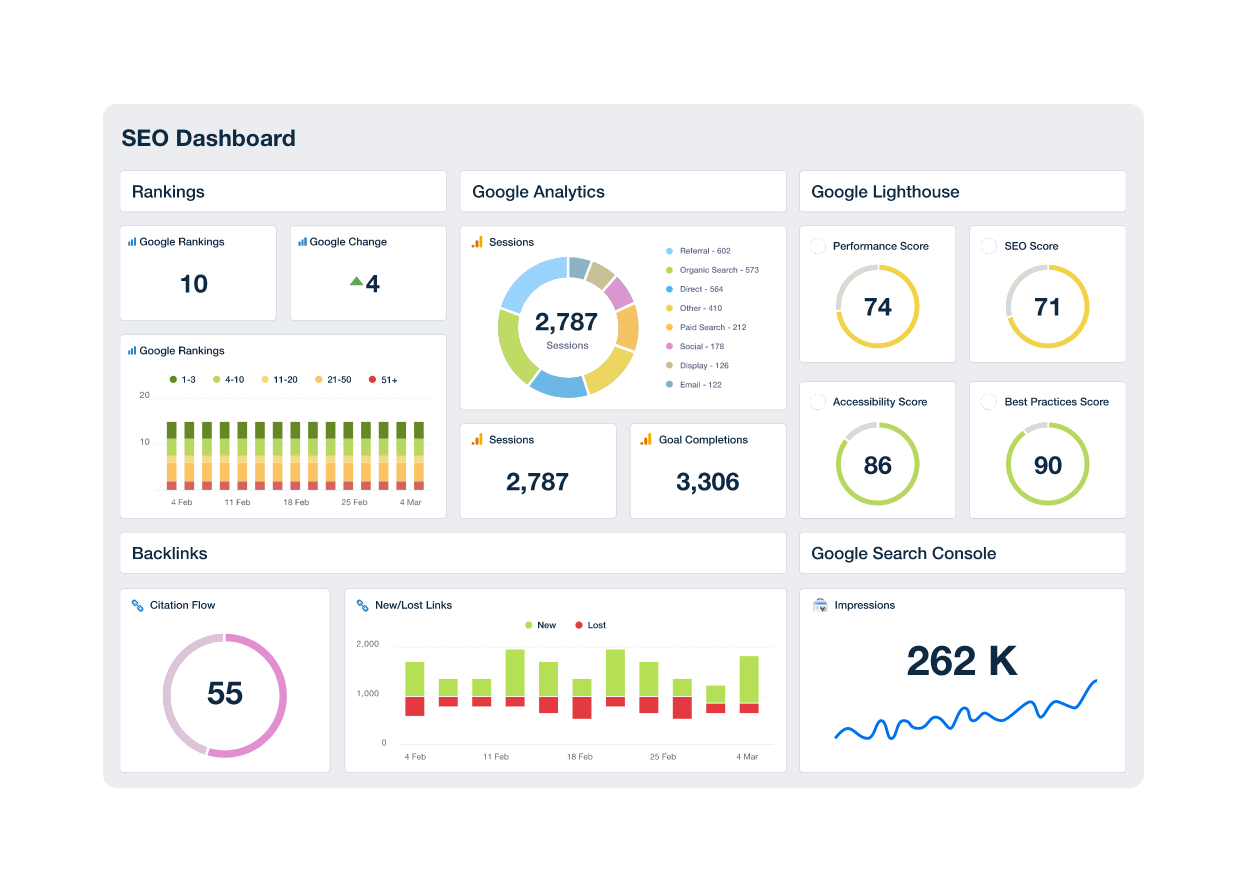
Create an SEO dashboard in minutes to show off your agency's SEO expertise and how it has impacted your client's visibility on top search engines. Start your free trial today!

Written by
Paul Stainton is a digital marketing leader with extensive experience creating brand value through digital transformation, eCommerce strategies, brand strategy, and go-to-market execution.
Read more posts by Paul StaintonSee how 7,000+ marketing agencies help clients win
Free 14-day trial. No credit card required.




